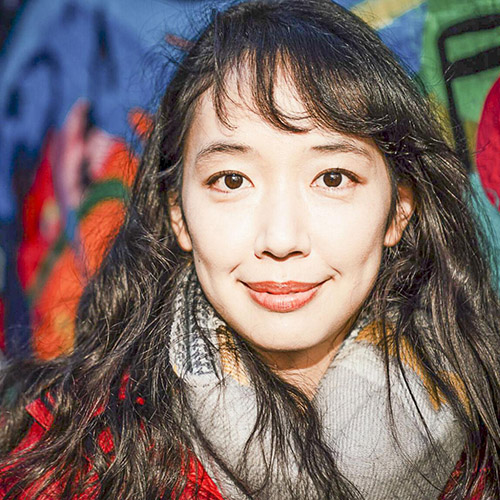Faculty and Visiting Faculty
CHristine kitano

Associate Professor, Creative Writing
Christine Kitano is the author of the poetry collections Birds of Paradise (Lynx House Press) and Sky Country (BOA Editions), which won the Central New York Book Award and was a finalist for
the Paterson Poetry Prize. She is co-editor of They Rise Like a Wave, an anthology of Asian American women and nonbinary poets. She holds an MFA in Creative
Writing from Syracuse University and a PhD in English and Creative Writing from Texas
Tech University. She teaches in the MFA and BFA programs at Stony Brook University
and has taught in the MFA Program for Writers at Warren Wilson College.
FACULTY INTERVIEW:
What genre(s) do you write in?
I am primarily a poet. I'm working on a book of craft essays right now, but those are craft essays about poetry.
What is the thing that excites you about the act of writing?
I like the feeling of making things. I like the process of working at something and seeing that a poem can change. I always forget that a poem can get better, until it does. It's such an enjoyable process. It's like cooking or baking, you get something at the end. A poem doesn't always feel as straightforward as baking, but it actually is. It just takes longer. I like feeling like there is a project, a process, and yet there's still some surprise to it.
Do you feel like your work is in conversation with other writers or work? If so,
who/what?
Every writer I have ever read is a part of my book. For the manuscript that I'm working on now, there were a few poets that I keep returning to whenever I felt a little bit stuck, or just need to hear something a little familiar. Natasha Tretheway, Ellen Brian Voigt, Marianne Boruch, Lucia Perillo, Jane Kenyon, and Jane Mead. When I need something really out there to shake me loose, I read Rilke.
What literary magazine would you recommend to your students?
This is my bias as a poet, but I like journals that focus on poetry. I rarely read short stories in a journal, I go straight to the poems because that's what I'm interested in. So I like journals that are almost all poetry, like Beloit Poetry Journal. Their focus is on narrative poems, so they're really good for teaching purposes and also learning purposes for yourself when you're writing. American Poetry Review, of course. They have good poems, and I like their essays. I generally like what Blackbird publishes as well.
What is your writing process?
It’s very regimented. I set aside a short amount of time, usually 25 minutes or 30 minutes. I say, for those 30 minutes only, I'm going to sit down and think about poems. I don't say that I have to write something, but I do have to think about poems. That makes it feel approachable. If there’s a day where I can't write something, I can read. But rarely do I ever get out of those 30 minutes without writing something, even if it was just rewriting a line that I liked. I accumulate these notes that I take without any real purpose or intention. When I go back and look at everything, I can start pulling at things and shaping poems.
How do you generate ideas?
I think it’s half your life and half what you read. Sometimes I'll start off a writing session, and it's just a diary entry about what happened today and what I saw on my way to work and things that don't feel like they would be important, but actually do make their way into poems later. Then, when I’m reading, I'll see an image or I'll hear some sort of rhythm and it gets stuck in my head, and usually that somehow makes its way into my work as well.
How do you manage when you get stuck?
Reading. I can't always write, but I can always read. A new thing that I've started doing is listening to music while revising, very specifically Bach. That actually allows me to hear different rhythms in the poems. There are poems that have felt stuck for years, but I was able to revise them by sort of distracting my brain with music while revising.
Inspiration or perspiration?
I'm much more of a perspiration person. I just keep working. I don’t think I can rely solely on inspiration. That doesn't feel like a solid way forward.
If you weren't a writer, what job would you have?
I would probably be a librarian. I feel like that would suit my current personality that I have, and the work I do is not all that different from being a librarian. But if I could be whatever I want, I would be a professional ballerina.
Do you have a writing tip for emerging writers?
I think the best way, if not the only way, to really learn how to write is to imitate. Look at the poems that stick with you and try to imitate something about them. Even if it's just lineation, or the use of imagery, or the way that the poem unfolds rhetorically. Just look at one of those elements and imitate that. It's not that you're trying to write your own version of the poem, but just trying to practice that skill. I don't know what visual artists do, but I imagine that some of them start out by tracing things, just learning how things are put together. Imitation is our version of that.
